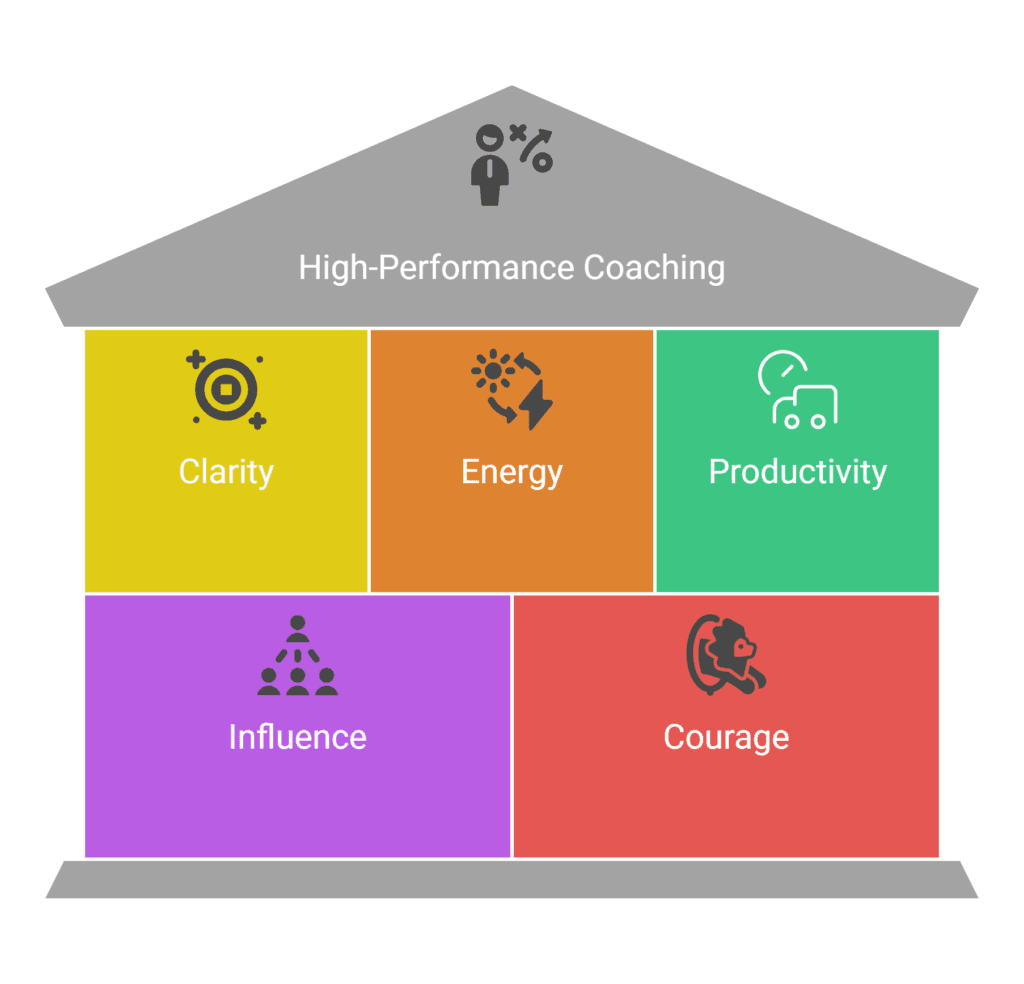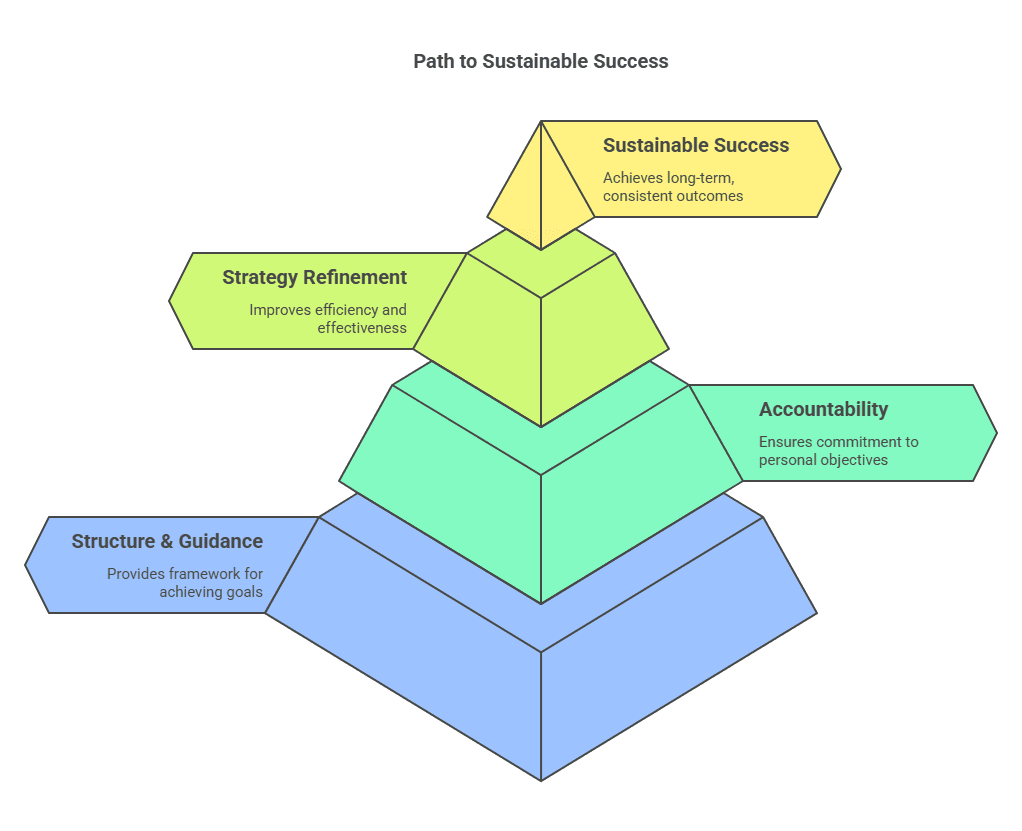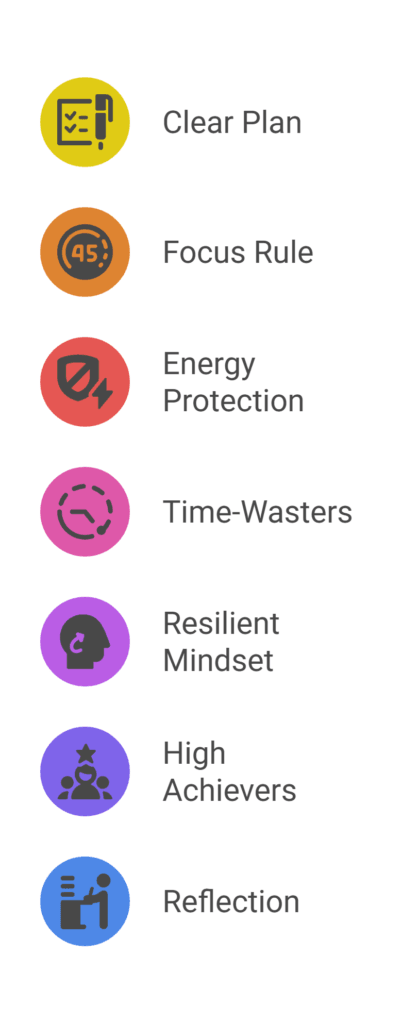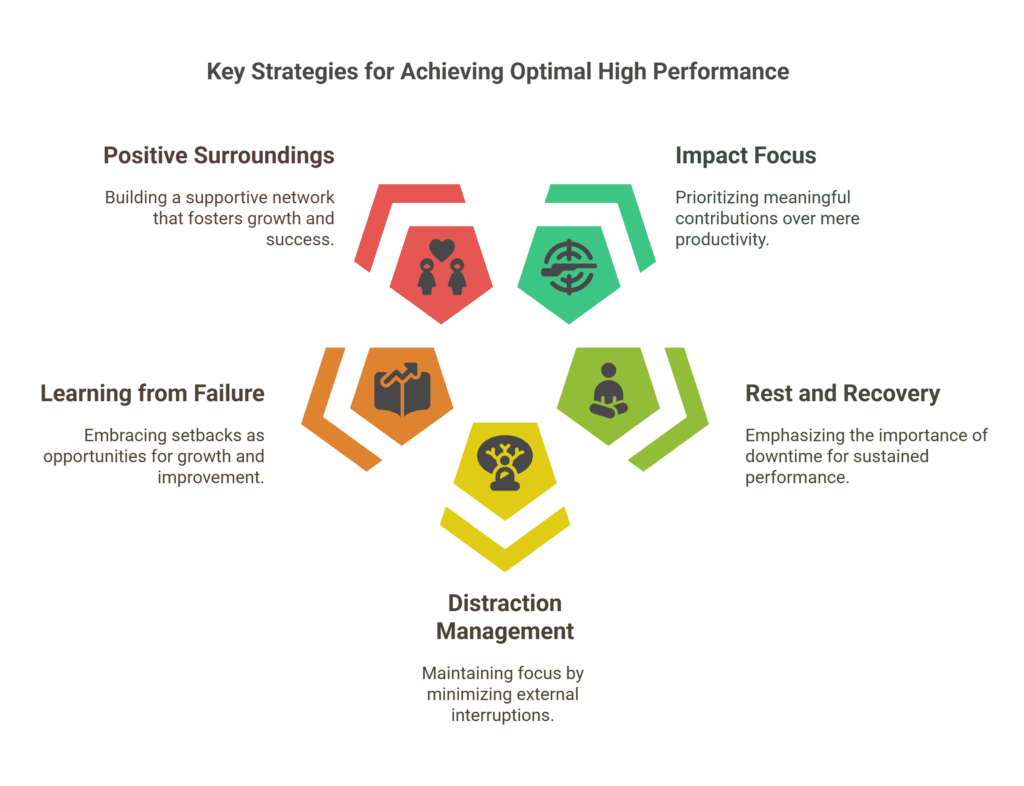What separates high achievers from the rest? It’s not just talent or luck, it’s high-performance habits backed by discipline, focus, and the right mindset. Whether it’s elite athletes, top executives, or industry leaders, they all follow proven strategies to push beyond their limits without burning out.
High-performance coaches play a crucial role in this process. Their coaching isn’t about working harder—it’s about working smarter. They help people master their energy, sharpen their focus, and stay consistently motivated. The goal? Sustained peak performance in every area of life without sacrificing well-being.
So read on, because this guide will break down the core principles of high-performance coaching and how you can apply them to reach your full potential. Whether you’re striving for career growth, athletic excellence, or personal success, the strategies ahead will help you perform at your best every single day.
What Is High-Performance Coaching?

High-performance coaching is a structured approach to achieving peak results without burnout. It’s designed for people who want to excel consistently whether in business, sports, or personal growth while maintaining balance and well-being.
Unlike traditional coaching, which often focuses on solving problems or developing specific skills, high performance coaching takes a bigger-picture approach. It’s about optimizing mindset, energy, productivity, and resilience to create long-term success.
At its core, it revolves around three key areas:
- Mindset – Training the brain to stay focused, confident, and adaptable in any situation.
- Habits – Building daily routines that create momentum and prevent burnout.
- Accountability – Staying on track with measurable goals and consistent feedback.
So read on, because mastering these principles can transform how you work, think, and perform every single day.
The Science Behind High-Performance Coaching
Why do some people consistently perform at their best while others struggle to stay motivated? Science has the answer. High-performance coaching is built on psychology and neuroscience, helping individuals train their brains for focus, resilience, and long-term success.
How the Brain Builds High-Performance Habits
The brain loves efficiency. When you repeat a behavior, your neurons create stronger pathways, making it easier to do the same action again. This is how habits are formed. Top performers leverage this by consistently practicing focus, discipline, and positive routines. Over time, these behaviors become automatic, requiring less effort to maintain peak performance.
Motivation, Focus, and Resilience: The Keys to Long-Term Success
- Motivation comes from dopamine, the brain’s reward chemical. Setting clear goals and celebrating progress keeps motivation high.
- Focus is strengthened by minimizing distractions and training the brain to enter a flow state a mental zone where work feels effortless.
- Resilience is built by reframing failure. Studies show that those who see setbacks as learning experiences bounce back faster and perform better under pressure.
How Top Performers Stay Sharp
Research on elite athletes, CEOs, and high achievers reveals common habits that fuel their success:
- Strategic breaks to recharge the brain and prevent burnout.
- Morning routines that set the tone for productivity.
- Mindfulness and visualization to stay mentally strong under stress.
So read on, because understanding these principles is the first step to rewiring your brain for peak performance.
Key Pillars of High-Performance Coaching
High-performance isn’t about talent or luck, it’s about developing the right habits and mindset. The most successful people don’t rely on motivation alone; they build systems that keep them focused, energized, and resilient. These core principles form the foundation of long-term success.

Clarity: The Foundation of Success
Without clarity, even the hardest workers struggle to make progress. High performers set specific goals and have a clear vision of what they want to achieve. A strong sense of direction helps them stay motivated and avoid distractions. They define their priorities and eliminate anything that doesn’t align with their mission. By breaking big goals into small, actionable steps, they create momentum and keep moving forward with purpose.
Energy: The Fuel for Sustained Performance
Peak performance isn’t just about mindset, it’s about having the energy to consistently show up at your best. Managing physical, mental, and emotional energy is essential. Sleep, nutrition, and exercise aren’t just personal health choices; they are tools that support focus and endurance.
When the body is run down, the mind follows. High achievers treat their bodies like an engine, fuel it well, and it performs better. Stress management also plays a role in maintaining energy. Simple practices like deep breathing, mindfulness, and scheduled breaks help prevent burnout and allow for long-term success.
Productivity: Maximizing Output Without Overwork
Being busy isn’t the same as being productive. High performers understand that working longer hours doesn’t always lead to better results. Instead, they focus on what truly moves the needle. They follow the 80/20 rule, meaning 80% of results come from 20% of efforts. Prioritizing the most important tasks helps them make the biggest impact in the shortest time.
They also eliminate distractions by creating focused work sessions, avoiding multitasking, and setting boundaries around their time. Simplifying and streamlining their work allows them to get more done while avoiding unnecessary stress.
Influence: The Art of Leadership and Persuasion
Success isn’t just about knowledge or skill, it’s also about how well you connect with others. High performers know that relationships, communication, and emotional intelligence play a huge role in achieving their goals. They build strong connections by listening, adding value, and creating genuine trust. Mastering communication allows them to influence decisions, inspire teams, and make a lasting impact. Emotional intelligence helps them navigate challenges, resolve conflicts, and lead with confidence.
Courage: Overcoming Fear and Setbacks
Every successful person has faced failure. The difference is that they don’t let it stop them. Instead of seeing setbacks as obstacles, they treat them as learning experiences. They understand that failure is part of growth and use it to improve. Having a growth mindset helps them stay resilient, knowing that skills and abilities can be developed over time. Some of the most inspiring success stories come from people who failed multiple times but refused to quit. The key is persistence, the willingness to push forward even when things get tough.
Now here comes the good part: mastering these principles doesn’t just help in work or business, it leads to a more focused, energized, and fulfilling life.
What Do High-performance Coaches Do
Reaching peak performance isn’t just about working harder, it’s about working smarter. A high-performance coach helps individuals unlock their full potential by providing structure, guidance, and accountability. Whether in business, sports, or personal development, coaching helps people break through mental barriers, build winning habits, and stay on track toward their goals.
While self-coaching is possible through discipline and self-reflection, having a professional coach like James accelerates progress by offering external insights, proven strategies, and personalized feedback. The best coaches don’t just push for more effort, they help refine strategies, eliminate inefficiencies, and create sustainable success.

How High-Performance Coaches Help Unlock Potential
- Identify blind spots and remove self-imposed limitations.
- Provide accountability to ensure consistent action.
- Help set clear, measurable goals that align with long-term success.
- Teach proven strategies to improve focus, productivity, and resilience.
- Shift mindsets from self-doubt to confidence through structured coaching.
Self-Coaching vs. Professional Coaching
- Self-Coaching: Requires strong discipline, self-awareness, and the ability to adjust strategies without outside guidance.
- Professional Coaching: Provides expert insights, accountability, and tailored strategies to fast-track growth and eliminate trial and error.
Traits of an Effective High-Performance Coach
- Strong Communicator: Breaks down complex ideas into clear, actionable steps.
- Results-Driven: Focuses on measurable progress rather than vague motivation.
- Accountability Partner: Ensures clients stay committed to their goals.
- Mindset Shifter: Helps individuals overcome self-doubt and push past limits.
- Adaptable and Insightful: Understands that success isn’t one-size-fits-all and tailors strategies to each individual.
So read on, because working with the right coach isn’t just about short-term wins, it’s about long-term, sustainable success.
Seven High-Performance Habits to Implement Today
Success isn’t about making big changes overnight, it’s about small, consistent habits that add up over time. Here are some powerful habits that high performers swear by to stay focused, energized, and at their best.

Start the Day with a Clear Plan
Instead of reacting to tasks as they come, set three top priorities every morning. This keeps you focused on what truly matters instead of getting lost in busy work.
Master the 90-Minute Focus Rule
Your brain works best in short, deep-focus sessions. Work for 90 minutes with full focus, then take a 10-15 minute break to recharge. This boosts productivity while avoiding burnout.
Protect Your Energy
High performers treat their energy like their most valuable asset. Quality sleep, exercise, and proper nutrition aren’t extras, they’re the fuel that keeps them sharp and performing at their peak.
Cut Out Time-Wasters
Mindless scrolling, unnecessary meetings, and multitasking drain your time and focus. High achievers set clear boundaries, batch similar tasks, and say no to distractions that don’t align with their goals.
Develop a Resilient Mindset
Challenges and failures are part of the game. Instead of seeing setbacks as roadblocks, reframe them as lessons and keep moving forward. The strongest performers don’t dwell on problems, they find solutions.
Surround Yourself with High Achievers
Who you spend time with shapes your mindset. Successful people surround themselves with driven, positive individuals who push them to grow, take action, and think bigger.
End the Day with Reflection
Take five minutes before bed to review what worked, what didn’t, and what you can improve. This habit builds self-awareness and keeps you on track for continuous growth.
So read on, because these small habits, practiced daily, will transform the way you work, think, and perform.
Common Mistakes That Hinder High Performance

Even the most driven individuals can fall into habits that slow them down without realizing it. Here are five common mistakes that hold people back from reaching their full potential and how to fix them.
- Chasing Productivity Instead of Impact – Working longer hours doesn’t mean working smarter. High performers focus on what actually moves the needle instead of staying busy with low-value tasks. Prioritize results over effort.
- Ignoring Rest and Recovery – Pushing hard without breaks leads to burnout. The best performers know that recovery is just as important as effort, quality sleep, proper nutrition, and mental resets keep performance sustainable.
- Letting Distractions Control the Day – Social media, endless notifications, and reactive work derail focus. Instead of jumping between tasks, high performers set boundaries, schedule deep work sessions, and take control of their time.
- Avoiding Failure Instead of Learning from It – Fear of making mistakes keeps many people from taking action. Instead of seeing failure as a setback, use it as feedback and adjust your approach. The faster you learn, the faster you grow.
- Surrounding Yourself with the Wrong People – Success isn’t just about mindset, it’s also about environment. Being around negative or unmotivated people drags you down. Choose to be around those who inspire, challenge, and push you forward.
Conclusion
High-performance isn’t a finish line, it’s a process. The most successful people don’t rely on motivation alone; they commit to small, consistent actions that compound over time. They refine their focus, protect their energy, and stay adaptable in the face of challenges.
Real progress happens when discipline replaces excuses and intentional habits replace guesswork. It’s not about doing everything at once, it’s about identifying what truly moves the needle and committing to it daily. Whether it’s sharpening your focus, cutting out distractions, or bouncing back faster from setbacks, the strategies are simple, but their impact is life-changing.
So read on, because the real work begins now. The choice is yours, keep doing what you’ve always done or start implementing what you’ve learned. The path to high performance is built one step at a time. Take the first one today.





